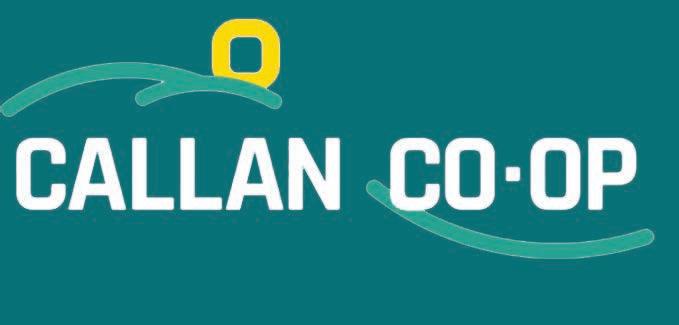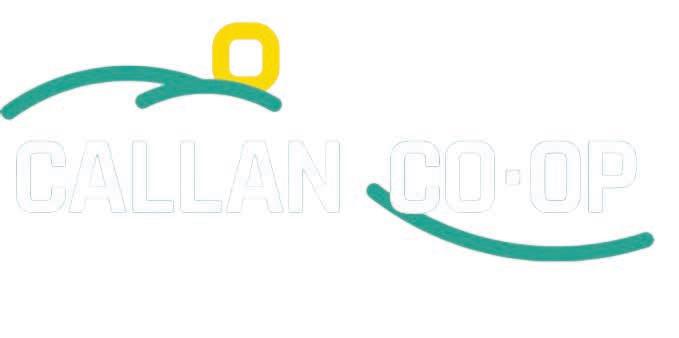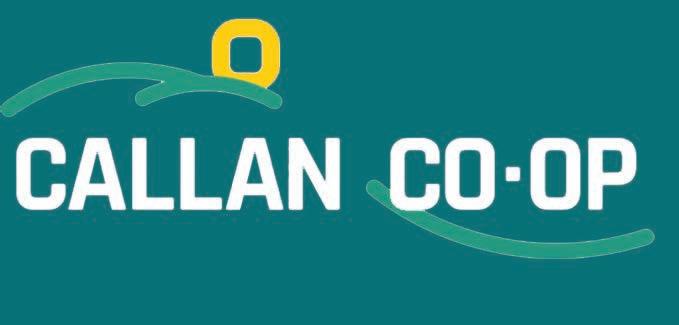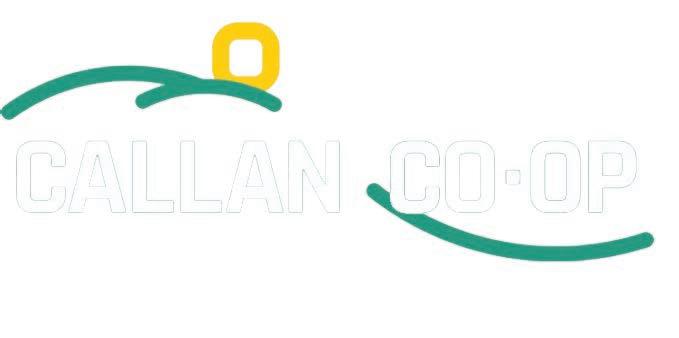
7 minute read
Here’s Lucey!
tinct Cork accent. Lucey looked him up and down after listening to his tale of woe, but seemed unimpressed.
BY JOHN FITZGERALD
Advertisement
Aweek after his father’s death (on D-Day: June 6th 1944) Michael ere were no “repeats” of exams in those days, so Michael had to approach Mr. Lucey minus a certi cate. e youngster stood shivering before the much talked about manager. He remembers him as a small grumpy man with a hump on his back who spoke with a dis- e bashful youth knew his dream of a desk job was fast fading. His heart sank as the full implication of Lucey’s frowning visage became clear. A penpushing sinecure in the creamery o ce was de nitely not on the cards. e Co-op was divided into two parts. e Creamery in West Street took in milk from the farmers, separated it from cream, made butter, and crushed oats and barley into animal foodstu s. e store in Green Street sold hardware, paint, glass, iron, and all sorts of curio goods. e store sta at the time Michael began working there included Jimmy Ryan of Modeshill and Tommy Grace. Maggie Maher of Knockbutton and Kitty McGrath of Ballyline had the posh o ce jobs. Michael envied them, as they sat perched on their soft seats, proud as peacocks, in a little glass cubicle just inside the entrance.
Byrne sat the Intermediate Cert exam, which he passed, in spite of the grief that overwhelmed him.
He fared less well two years later with the Leaving Cert. Illness prevented him from studying for the exam and he had to skip three essential subjects as a consequence. is wrecked his ambition to ll a clerical post in the local Co-op, where Manager Tim Lucey was looking out for a bright young student who could join his sta .

Instead of a clerical job, Michael found himself instead working as a general assistant in the hardware and meal stores in Green Street. His weekly wage starting o was one pound-less stamp duty.

In July 1946, he set out from Castletobin on his father’s trusty old bike to begin his rst day’s work at Callan Co-op. He recalls that it was “no ordinary bike, having a twenty-six inch frame- two inches longer than the standard one”. Michael had to have the bike leaning against a wall to mount it.


A farmer would drop in to the store after he had delivered his milk to the creamery, though the general public was also well catered for. e store workers would often be run o their feet, serving customers.

Because he was the youngest, Michael got all the dirtiest jobs to do. He had to ll bags with lime, cement, and manure, or shovel coal on a wet day, the rain or hailstones pelting down without mercy.
He was the one the others let go “up the yard” on cold or rainy days, and to handle messy items like tar, turpentine and creosote. Gerry Fitzgerald of Prologue and Johnny Tobin of Ahenure, joined the Coop around the same time as Michael. Both would remain with the sta for the next four decades or more. e Tea-Break Dilemma ere was a strange anomaly in the store that Michael could e Corkman almost caught the tea drinkers one day after Johnny Tobin had toasted bread with a blowtorch. Just as the slice of fresh rustic was turning a nice light brownish tinge, someone shouted: “Johnnie, for God’s sake, the boss man is outside!” e Manager frowned, raised a fore nger in an accusatory gesture, and spoke with great deliberation: “If I nd anyone, Tobin, Anyone, blowtorching bread on these premises, there’ll be hell to pay. Do you understand me?”
Johnnie slipped the toast into his shop coat pocket, switched o the blowtorch, and calmly walked over to open the door for Lucey. “Do I smell something?” snapped the Manager, his eyes narrowing and suspicion clouding his diminutive hunched frame. “Just testing the blowtorch, Sir, the customer wanted to see it operating”.
“ ere’ll be no bread blow- torched here, I promise you that, Sir!” Johnnie replied. It was to be twenty- ve years before he enjoyed another slice of toast in the Co-op.

On rare occasions, though, Michael would grab a quick mouthful of tea or Bovril and a slice of Billy Walsh’s apple tart or current bread. A fellow worker would act as lookout. To this day, Michael is unsure as to whether the Co-op tea break was “o cial” or not. And he wonders if Lucey ever actually saw anyone drinking tea in the store!
A Wicked Sense of Humour Desmond Fitzgerald, brother of Gerry, worked with Tim Lucey for a while in the 40s. He recalls that the Manager had little time for socialising, was a keen observer of human nature, and possessed a “wicked sense of humour”. One evening, a woman knocked at the creamery o ce door to look for a pound of butter.
As rationing was in force, and butter scarce, she had to be very persuasive to get her hands on the precious commodity. Smiling broadly, she explained that a big reception was planned and the butter would be required to avoid serious disappointment to her guests.
She then started praising the manager. “I’ve been told you are the most generous, decent, kindhearted, most considerate man that ever set foot in Callan town, Mr. Lucey”, she crowed, clapping him on the back.
Lucey, having listened patiently to her plea, assumed a dark, unfriendly expression and said: “No, Missus, I can’t give you the butter, close the door on the way out!”
Her mood changed drastically. She launched into a savage attack on Lucey. Flushed with anger, she shook her st at him, shouting: “You’re a mean (pronounced mane), miserable, humpy backed bastard. God! Your mother must have been desperate for children when she reared you!” e wily Corkman laughed and said: “I knew that’s what you thought of me, Missus”, I just wanted to be sure. Now, here’s your butter”.
Milk, Wheat, and Big Jim Bolger
Milk was conveyed to the creamery in churns of all shapes and sizes. It was weighed in pounds, and separated from the cream. e cream was converted into butter and stored. Milk suppliers were paid by cheque at the end of each month.
Consumers had a high opinion of Callan butter. Every week, lorry loads of it were transported around the county and into the neighbouring counties of Laois, Carlow, and Kildare. Michael Carroll and Tommy Burke oversaw and implemented this lucrative trade, keeping the lorries on the road. Michael


Byrne remembers other stalwarts too, like Jack Fitzpatrick, Tom Connors, Butter Maker Nellie Denny, Mick Peters, who decided on how much separated milk to give back to farmers (his decisions were often questioned, but never appealed, or overturned); and Jack Townsend, who took in the milk at the creamery’s Knockulty branch.

Wheat was collected by creamery lorries at Harvest time and taken to the Co-op store. ere, it was “bushelled” for moisture content, weighed and scooped into sacks. It was then driven to Mosses Mills, Bennetsbridge. Oats and barley was crushed or rolled and sold back to farmers as foodstu s. In addition to this service, the creamery had its own threshing set. Michael remembers Jim Bolger (“a giant of a man”) calling to farms in the Callan area: “Besides the engine, there was the mill and elevator and setting these up in a farmyard on a dark and maybe wet night was a hazardous job. But Jim and his helper were always equal to the task”
Jim’s wife, Molly, ran a pub in Mill Street. Michael heard a story about how Molly reacted to a Garda raid on the premises: Drinkers panicked when three loud knocks on the door betokened the moment they all dreaded. Stools tumbled; men ran about like headless chickens, bottles and glasses fell to the ground.
Molly, standing behind the counter, asked them to relax and not to worry. “Sit down and don’t be getting upset over noth- ing”, she intoned, as she calmly cleaned a stout glass, “Sure it’s only auld Lynch, the big fat sergeant.”
A Wage Rise? In Your Dreams, Boy!
Michael enjoyed the few occasions when he was allowed to accompany Richie Condon in the lorry on his journeys. He will never forget the coughing and wheezing, and the tears in his eyes, as he helped to load up a cargo of hydrated lime at a plant in Carlow. e dust was sti ing. Clouds of it swirled about Richie and himself as they heaved the bags onto the lorry on a sweltering June afternoon. But at least this was di erent, he thought, a welcome change from the daily routine. Michael appreciated a break from the hardware store.
In February 1951, Michael found the courage to ask Tim Lucey for a wage rise. He felt he deserved it for the quality of workmanship he had provided.
e Corkman saw things differently. He had a particular aversion to workers seeking pay rises. To him, this was the ultimate impertinence.
Michael’s request was turned down, and he gave Lucey four weeks notice of his decision to quit the job. He said goodbye to his friends and fellow workers at the Co-op.
Michael continued to work in the hardware trade for the next 31 years. He served from behind counters in places as far a eld as Kildare town, Moone, Castledermot, Dublin, Granard, Oldcastle, Roscommon town, Bunclody, and Edenderry.


He ended up with Connolly Brothers of Drogheda in 1960 where he “held the fort” until the rm hit bad times in 1977.
Michael was forced to accept a redundancy payment. us ended a career that began in Callan in 1946.
Since retirement, he has devoted most of his energies to his life-long passion for hurling. He tells the story of his sporting adventures in a book entitled From Noreside to Boyneside. e book contains a painstakingly detailed, blow-by-blow account of almost every hurling game he has attended.
When he is not watching, listening to, or analysing a match, Michael Byrne is likely to be found spinning yarns about his days in Callan Co-op.
***

(Michael Byrne died since that article appeared in the book)










